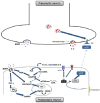Omega 3 Fatty Acids: Novel Neurotherapeutic Targets for Cognitive Dysfunction in Mood Disorders and Schizophrenia?
- PMID: 26467414
- PMCID: PMC4761636
- DOI: 10.2174/1570159x13666150630173047
Omega 3 Fatty Acids: Novel Neurotherapeutic Targets for Cognitive Dysfunction in Mood Disorders and Schizophrenia?
Abstract
An increasing body of evidences from preclinical as well as epidemiological and clinical studies suggest a potential beneficial role of dietary intake of omega-3 fatty acids for cognitive functioning. In this narrative review, we will summarize and discuss recent findings from epidemiological, interventional and experimental studies linking dietary consumption of omega-3 fatty acids to cognitive function in healthy adults. Furthermore, affective disorders and schizophrenia (SZ) are characterized by cognitive dysfunction encompassing several domains. Cognitive dysfunction is closely related to impaired functioning and quality of life across these conditions. Therefore, the current review focues on the potential influence of omega-3 fatty acids on cognition in SZ and affective disorders. In sum, current data predominantly from mechanistic models and animal studies suggest that adjunctive omega-3 fatty acid supplementation could lead to improved cognitive functioning in SZ and affective disorders. However, besides its translational promise, evidence for clinical benefits in humans has been mixed. Notwithstanding evidences indicate that adjunctive omega-3 fatty acids may have benefit for affective symptoms in both unipolar and bipolar depression, to date no randomized controlled trial had evaluated omega-3 as cognitive enhancer for mood disorders, while a single published controlled trial suggested no therapeutic benefit for cognitive improvement in SZ. Considering the pleiotropic mechanisms of action of omega-3 fatty acids, the design of well-designed controlled trials of omega-3 supplementation as a novel, domain-specific, target for cognitive impairment in SZ and affective disorders is warranted.
Figures



References
-
- Bourne C., Aydemir Ö., Balanzá-Martínez V., Bora E., Brissos S., Cavanagh J.T., Clark L., Cubukcuoglu Z., Dias V.V., Dittmann S., Ferrier I.N., Fleck D.E., Frangou S., Gallagher P., Jones L., Kieseppä T., Martínez-Aran A., Melle I., Moore P.B., Mur M., Pfennig A., Raust A., Senturk V., Simonsen C., Smith D.J., Bio D.S., Soeiro-de-Souza M.G., Stoddart S.D., Sundet K., Szöke A., Thompson J.M., Torrent C., Zalla T., Craddock N., Andreassen O.A., Leboyer M., Vieta E., Bauer M., Worhunsky P.D., Tzagarakis C., Rogers R.D., Geddes J.R., Goodwin G.M. Neuropsychological testing of cognitive impairment in euthymic bipolar disorder: an individual patient data meta-analysis. Acta Psychiatr. Scand. 2013;128(3):149–162. doi: 10.1111/acps.12133. - DOI - PubMed
Publication types
MeSH terms
Substances
LinkOut - more resources
Full Text Sources
Medical
